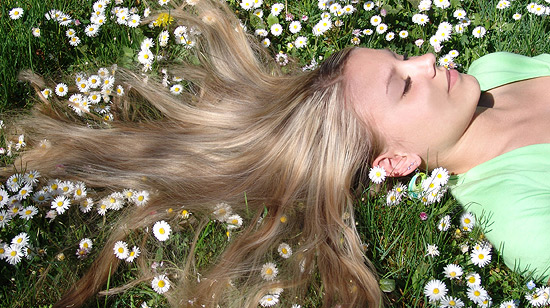Dream hair or traumatised hair?
Hair tells us a lot about a person. It shows if s/he is young or old, healthy or sick, happy or unhappy. Recipes for healthy hair have abounded all over the world throughout history. There is no denying it: beautiful, luscious hair is a symbol of sensuality and eroticism.

It is hardly surprising then that women are unhappy when their hair is thinning, loses its shine or falls out altogether.
Hair condition reflects skin condition and, like the skin, it is strongly influenced by hormones. Sex hormones control not only hair growth, but also the quality and distribution of hair on head and body.
Hair loss is only a symptom, which may have many and varied causes:
- Hormone-induced hair loss
- Thyroid problems
- As a side effect of illness
- As a side effect of taking medication
- Metabolic disorders
- Crash dieting, eating fast food
- Vitamin, mineral and amino-acid deficiency
- Nicotine
- Immune deficiency
Alopecia areata (bald patches) is a particular form of hair loss.
In most cases, the cause of hair loss can be identified by means of a detailed patient history and specific hormone analysis
since hormones bear up to 80% responsibility for hair loss.
Special topical treatments, such as hormone-based hair lotion have proved very effective in practice. Equally, the administration of
individually selected combined amino acids
often shows visible results within a very short space of time (see also section on amino acids or www.vitalogic.at).
Causes of hormone-induced hair loss
One of the most common causes of hair loss, responsible for some 80% of all cases, is congenital hypersensitivity of the hair follicles to the male sex hormone testosterone - this applies to both men and women, since testosterone is also formed in women.
When do women suffer increased hair loss?
Very often the cause is hormone fluctuations, which occur following pregnancy and with the onset of the menopause. Production of female hormones decreases and male sex hormones become predominant - in other words, the balance shifts in favour of the male hormones. Discontinuation of the pill also often leads to increased hair loss. The pill largely suppresses production of the male hormones. Therefore, when a woman stops taking it, natural release of the male hormones resumes and, if the hair follicles are hypersensitive, this may lead to hair loss.
Symptoms
The typical picture is one of diffuse hair loss. It usually begins at the back of the parting, in combination with generally thinning hair. When it reaches an advanced stage, the scalp is visible all around the parting.
Treatments:
Restoration of the male/female hormone balance on the scalp.
Local (topical) application of hair lotions is particularly effective in treating hormone-induced hair loss. The two female hormones OESTRADIOL and PROGESTERONE are applied in the form of hair lotion (E3 hair lotion with progesterone). This is even more effective if CPA lotion is used at the same time, as this suppresses the male receptors in the hair follicles.